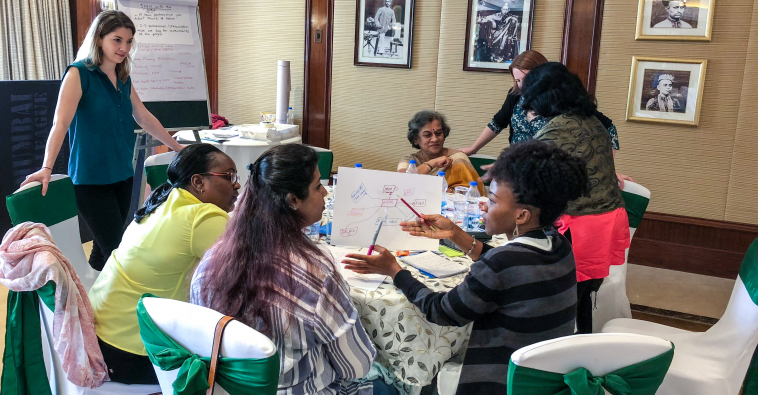Cross-country learning in Mumbai

Pictured: PPIUD project team workshop
FIGO recently hosted PPIUD project teams at a four-day workshop, coming together to discuss progress and plan for the next phase. Arefa Hossain Antora explains the value of these sessions and the impact their work is having on women around the world.
Last week, the PPIUD Initiative held a workshop in Mumbai for country teams from India, Bangladesh, Nepal, Sri Lanka, Tanzania and Kenya.
The workshop was an invaluable opportunity for project teams to come together and share their experiences of the initiative thus far, as well as discussing future plans. I attended as Project Manager for the Obstetrical and Gynaecological Society of Bangladesh PPIUD team.
The first day of the meeting focused on cross-country learning over the past 5 years of the initiative. Each country representative presented on a key aspect that has been a particular success in his or her context.
This sparked dynamic Q&A sessions which flowed on through lunch. On the second day the countries split up according to their roles, and spent time as a group considering role specific issues. I learned a huge amount from the Project Managers session, where we were able to identify key challenges in our own country initiatives and discuss how to tackle them.
My favourite part of the meeting included the opportunity to visit a health facility in Mumbai where the PPIUD initiative is running successfully. There was also great enthusiasm for preparing an action plan for the next phase of the project - the main focus of days three and four.
Access to PPIUD and other family planning options is an issue that is hugely important in Bangladesh. There is a high level of unmet need for contraception, at 19.2% in 2017, and short birth spacing can cause reproductive health problems.
This is even more likely to be the case for women of a low socioeconomic background, who rarely have contact with the health system. The vast majority of post-natal women leave facilities without receiving any contraception.
Worldwide, more than 9 out of 10 women want to avoid pregnancy for 2 years after having had a baby, but 1 in 7 of them is not using contraception. PPIUD is a long-acting and low-cost contraceptive option, which makes it an important option within the broader contraceptive menu.
In Bangladesh the midwife cadre has recently been formally introduced, creating an excellent opportunity for expanding family planning care. The workshop in Mumbai gave us all a chance to productively discuss how to fully engage with this cadre in the next phase of the project, as well as learn from other countries who have already benefitted from their involvement.